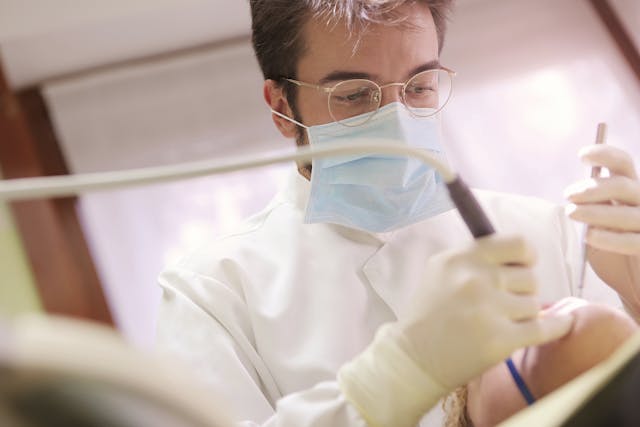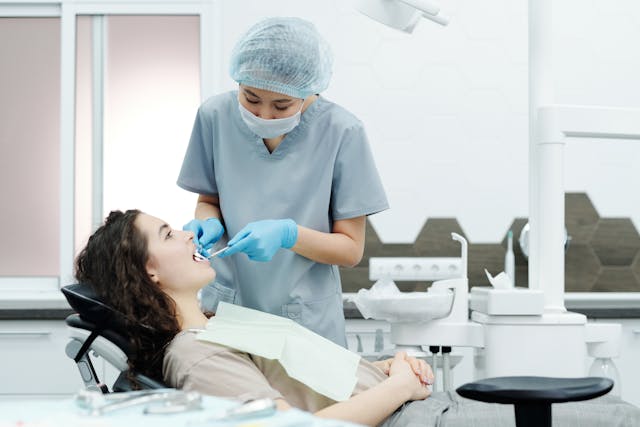A bright, healthy smile is more than just an aesthetic asset. Rather it forms an integral part of general wellbeing. At the heart of this kind of smile lies preventative dentistry: a proactive approach to maintaining oral health that focuses on preventing dental problems before they develop. This article explores the significance of preventative dentistry and how it contributes to long-term oral health.
Understanding Preventative Dentistry
Preventive dentistry is any practice or procedure aimed at achieving oral health as well as averting the advancement of tooth decay, gum diseases, and any other dental disorder. At vibrant dental, the emphasis is on proactive care that aligns with the mantra that taking proper care of one’s teeth and gums today prevents one from later pain, discomfort, and costs in the dentist’s chair.
The Foundation Of Oral Health
The backbone of preventive dentistry is composed of regular dental check-ups, proper oral hygiene, and lifestyle choices that support dental health. By integrating these preventive measures into daily life, individuals can significantly reduce their risk of common dental problems such as cavities, gum disease, and tooth decay.
Key Components Of Preventative Dentistry
Regular Dental Check-ups
Routine dental visits ensure good oral hygiene. The professional will examine each tooth for possible decay, gum disease, or even oral cancer. Early discovery of these conditions facilitates early treatment to prevent the establishment of more advanced conditions.
Professional Cleanings
Professional dental cleanings are a critical part of preventative care. Cleanings remove plaque and tartar buildup that brushing and flossing cannot. Professional cleanings keep teeth clean and free of harmful bacteria, preventing cavities and gum disease.
Dental Sealants and Fluoride Treatments
Preventative treatments like dental sealants and fluoride applications provide additional protection against tooth decay. Sealants create a protective barrier on the chewing surfaces of molars, while fluoride strengthens tooth enamel, making it more resistant to acid attacks from plaque bacteria.
The Benefits Of Preventative Dentistry
Cost-Effective Care
The cost-effectiveness is one of the most important advantages of preventative dentistry. With regular check-ups and cleanings, individuals avoid more expensive and invasive treatments down the line. For every dollar spent on preventive dental care, studies have shown that $8 to $50 can be saved in restorative and emergency treatments.
Early Detection of Dental Issues
Dental visits permit early detection of any potential issues. Dentists are able to spot conditions like cavities, gum diseases, or oral cancer in its initial stages of treatment. All these can then be treated, hence avoiding minor cases to become dental issues.
Good Health as a Whole
The advantages of preventative dentistry go further than oral health. Poor oral hygiene has been linked to many systemic health conditions, including cardiovascular disease, diabetes, and respiratory problems. With good oral health, preventative care may reduce one’s risk for these associated health conditions.

Preventative Dentistry In The Home
Professional dental care is important, but much of the work of preventative dentistry occurs in the home through regular daily oral hygiene practices.
Good Brushing and Flossing
Brushing twice a day with fluoride toothpaste and flossing daily are basic practices that prevent tooth decay and gum disease. These habits remove plaque and food particles that can lead to dental problems if left unchecked.
Healthy Diet Choices
Diet is another important aspect for oral health. Avoid sugary and acidic food and beverages in order to not develop tooth decay. Instead, consume food high in calcium and vitamins, which help the development of healthy and strong teeth and gums.
Hydration by Water
More water, tap water especially containing fluoride, washes away the leftover food particles and bacteria from your mouth while giving strength to the enamel.
Preventative Dentistry For Children
Establishing good oral health habits early in life is essential for ensuring long-term oral health. Preventative care in children:
- Evidently, the first visit to the dentist should occur when a child gets their first tooth, or by their first birthday
- Proper brushing and flossing techniques
- Application of dental sealants and fluoride treatments
- Healthy eating habits that support oral health
With these habits established, parents would definitely put their kids up for a healthy smile lifetime.
Overcoming Barriers To Preventative Care
Although important, many patients are faced with various barriers to seeking preventative dental care. These can be cost issues, dental phobia, or lack of information on the benefits of preventative care. The most important role is played by dental professionals and public health initiatives, which educate and provide affordable access with techniques to help manage dental phobia.
The Future Of Preventative Dentistry
As dental technology advances, preventative dentistry will continue to improve. New diagnostic tools and improved preventative treatments, along with enhanced patient education methods, have made it easier than ever to maintain good oral health. As early as through digital imaging which can detect cavities earlier, through personalized oral care plans based on genetic factors, the future of preventative dentistry looks promising.
Conclusion: A Lifelong Commitment to Oral Health
Prevention means investing in total oral health or prevention of other illnesses. Taking an active step into prevention shows responsibility regarding an individual’s lifestyle and attitude in general; taking care of preventive dentistry promotes the right state of body functionality and allows its owner to show off beautiful bright teeth well within his whole lifespan from preventive oral checkup treatments to ordinary cleanliness.
Remember, a healthy smile is an asset for life. By embracing preventative dentistry, you’re not just protecting your teeth and gums; you’re investing in your quality of life. Make preventative dental care a cornerstone of your health routine, and you’ll reap the rewards of a healthy, confident smile for years to come.
